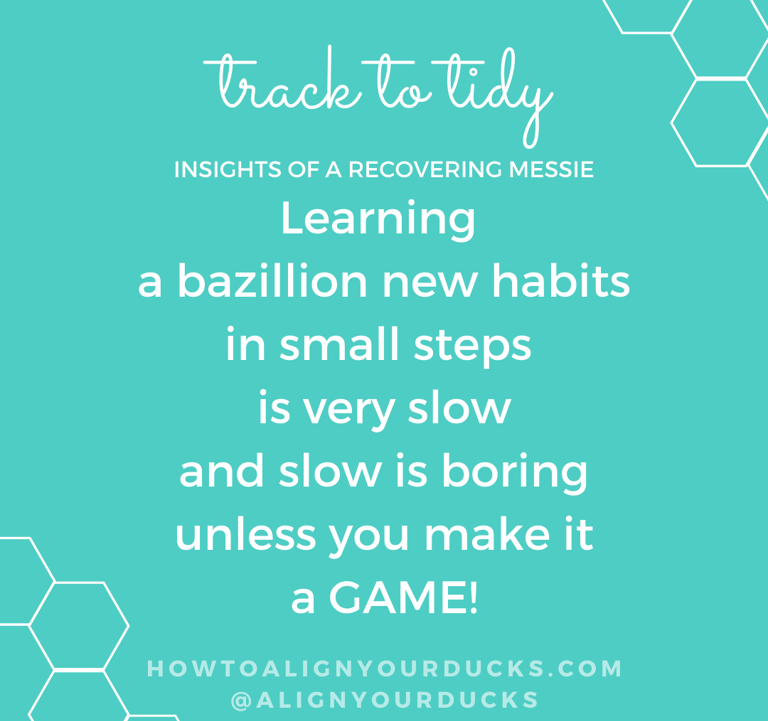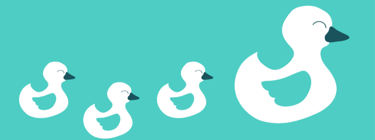6. ...which is slow and boring, so make it a game!
Track To Tidy Insights 6/6
In this series of blog posts I take you through the thought process that lead me to the game Track To Tidy. All these principles are common sense and were familiar to me already but I didn't really internalize them until going through this track of thoughts. I hope my insights will help you find a solution to your issues with clutter, whether it's this game of mine or a different one you develop for yourself.
Part 1. When schedules and checklists won't work for you...
Part 2. ...would minimalism work?
Part 3. Do this one thing and you'll have a tidy home...
Part 4. ...but actually, it's not one thing but a million different things!
Part 5. Make the steps so small, you can't fail...
"The greatest threat to success is not failure but boredom. We get bored with habits because they stop delighting us. The outcome becomes expected. And as our habits become ordinary, we start derailing our progress to seek novelty. "
- James Clear, the author of "Atomic Habits" (a book I highly recommend!)
The last waypoint on my track to tidy was figuring out how to make learning a bazillion habits one tiny step at a time fun and compelling - or at least not-boring!
After realizing I had to learn a bazillion different habits of putting it where it belongs, break each of them into tiny steps, and progress very slowly to get them ingrained, I had a brief moment of despair because I knew I sucked at being consistent and following through with boring repetitive tasks.
But the despair lasted only for a second before my brain spitted out the answer: gamification! If it's boring, make it a game!


During my years of trying to crack the code for tidiness, I had read about gamification. Gamification is a way to motivate someone to perform otherwise mundane tasks with using psychological tricks often used in games.
Games are designed to get us hooked with e.g. rewards, increasing difficulty, challenges, and puzzles. I have always loved games, especially certain PC games (like StarCraft and Civilisation), and as a student I struggled not to let my studies suffer from too much gaming. Games give us a boost of dopamine so we ADHDers can get easily addicted to gaming, so why not use it in my favor!
If I just could develope a game that would keep me hooked while teaching me new tidy habits, I would have solved the whole puzzle and found the silver bullet to finally end my struggle with chaos, home shame, and feelings of inadequasy! This silver bullet just wasn't going to be as fast as a bullet but rather a bullet riding on a snail (riding on a tortoise :D).
My learning process...
This is how fast the seed clutter grows into a massive pile on my desk top!
An idea of a kind of a board game started to form in my mind. To keep me motivated, it should make me reflect on my reasons for wanting to get in the process and help me come up with rewards for each step . The game board would make my progress visible. It should make me analyze each piece of chaos and guide me in choosing the right action for them.
It shouldn't be a rigid pre-filled decluttering checklist as I didn't want to be tied to a strict plan. I wanted to come up with guidelines that would choose the worst and most annoying clutter hotspots, so I wouldn't get paralyzed not knowing where to start.
I also knew that after planning the perfect track for my situation, the game should guide me through every step of the implementing process with no possibility of exit with an excuse. It needed to have a clear rules and guidelines on how to move forward in any situation so I wouldn't get stuck with something I didn't know what to do with.
You know the small pile of miscellanious clutter you usually end up with when decluttering and don't know what to do with it or where to put it? You'll just leave it there and soon it starts to attract more and more clutter. It's like seeds or roots of weed: if you don't take every single bit away, it starts to grow back very quickly. The game should guide me to find a destination for all this seed clutter, too.
It should ask me the right questions for finding the right place for everything and establishing the right habits. And it should guide me to reward myself for performing the habits and progressing with very small steps towards a Grand Prize that I'd choose for finishing one game.
So I immersed myself into the oblivion of hyperfocus and drafted the first version of the game, which later got the name Track To Tidy. I started playing it first with hand drawn game board and developed the questions and guidelines according to my experiences. And oh boy, how I was amazed from the results! Learning tidy habits was suddenly easy and effortless. I didn't have to feel guilty for all other parts of the chaos as I had the "official permission" to work only on this infinitesimal part of it and the rest just waited for it's turn.
I was so exited that I shared my idea with a friend - a fellow messy ADHDer - and she got exited, too! She's been my first and best tester, and has helped me a lot by giving me feedback as the game has evolved.
